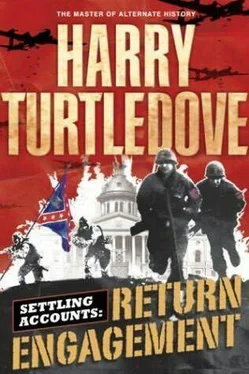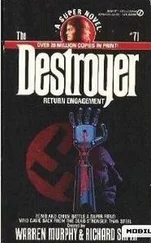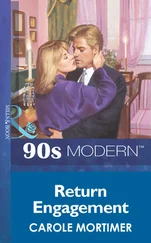Harry Turtledove - Return engagement
Здесь есть возможность читать онлайн «Harry Turtledove - Return engagement» весь текст электронной книги совершенно бесплатно (целиком полную версию без сокращений). В некоторых случаях можно слушать аудио, скачать через торрент в формате fb2 и присутствует краткое содержание. Жанр: История, на английском языке. Описание произведения, (предисловие) а так же отзывы посетителей доступны на портале библиотеки ЛибКат.
- Название:Return engagement
- Автор:
- Жанр:
- Год:неизвестен
- ISBN:нет данных
- Рейтинг книги:5 / 5. Голосов: 1
-
Избранное:Добавить в избранное
- Отзывы:
-
Ваша оценка:
- 100
- 1
- 2
- 3
- 4
- 5
Return engagement: краткое содержание, описание и аннотация
Предлагаем к чтению аннотацию, описание, краткое содержание или предисловие (зависит от того, что написал сам автор книги «Return engagement»). Если вы не нашли необходимую информацию о книге — напишите в комментариях, мы постараемся отыскать её.
Return engagement — читать онлайн бесплатно полную книгу (весь текст) целиком
Ниже представлен текст книги, разбитый по страницам. Система сохранения места последней прочитанной страницы, позволяет с удобством читать онлайн бесплатно книгу «Return engagement», без необходимости каждый раз заново искать на чём Вы остановились. Поставьте закладку, и сможете в любой момент перейти на страницу, на которой закончили чтение.
Интервал:
Закладка:
"No, we'll keep them. We can use their testimony about Confederate atrocities. And they're supposed to be pretty good musicians, if you like that kind of thing." Roosevelt's laugh was a little self-conscious. "Not really to my taste, I'm afraid: too wild. But some people are excited that they've made it over the border. Satchmo and the Rhythm Aces, they're called."
"Satchmo?" Flora wasn't sure she'd heard straight.
"That's right." Franklin Roosevelt laughed again. "I gather he was named, er, Sennacherib, but nobody who knew him could pronounce it. I believe that-I can't pronounce it myself."
"Sennacherib is a fancy handle even for a Negro from the Confederate States," Flora agreed. "Will we be bringing, uh, Satchmo and the-the Rhythm Aces, did you say?-to Philadelphia? This is where the wireless networks have their headquarters."
"Yes, I think we'll do that. I don't know how much broadcasting we'll have them do, though. What we call English and what they call English are almost two different languages, I'm afraid."
"I'd like to see them when they get here," Flora said.
"Actually, I was hoping you'd say that." The Assistant Secretary of War sounded pleased. "You've taken the lead in telling the world about what the Confederates are doing to their colored population."
"It's worse than what the Ottomans did to the Armenians during and after the Great War," Flora said. "If the Russians started killing off their Jews, that might come close, but even it wouldn't be the same."
"The Russians or the Germans," Roosevelt said. "With the Kingdom of Poland a German puppet, the Kaiser rules over as many Jews as the Tsar does."
"Yes, but the Russians have pogroms for the fun of it, and to distract people from what a mess the Tsar's government is," Flora answered. "The Germans are too civilized for that kind of thing, thank God."
"Half their brain trust are Jews, too. They can't afford to do without them," Roosevelt said. "But that's beside the point. Satchmo and the Rhythm Aces have heard about you, too. So I'm doubly glad you want to meet them, because they've already said they want to meet you."
"How have they heard about me? Do you know?" Flora asked.
"From the wireless, mostly, I think," Roosevelt told her. "That's good to hear; it shows some of our propaganda is getting through. Would you like to be there on the platform when they come in?"
"That might be nice." Flora sighed reminiscently. "When I was first elected to Congress and came down here to start my term, Hosea met me on the platform and took me to my flat. That was the first time we met. I had no idea it would go the way it did."
"He was a good man. A good man," Franklin Roosevelt said. "I've always thought it was horribly unfair to blame the business collapse on him. If it weren't for that, he would have made a fine President. No, that's not right-he did make a fine President. It's just that the times were against him."
"Thank you. I've always thought the same thing," Flora said. "And we elected Coolidge-and got Hoover. Coolidge wouldn't have made things better, and Hoover didn't. And the Confederates chose Jake Featherston, and the French got Action Francaise and a king, and the English got Mosley and Churchill. That's a lot to pin on an Austro-Hungarian bank failure, but it's the truth."
"If you toss a pebble into a snowbank, you can start an avalanche that will wipe out everything down below," Roosevelt said. "The first failure was a pebble, and the avalanche rolled downhill from there."
"Didn't it just!" Flora said mournfully.
When Roosevelt spoke again, it was after a paper-shuffling pause: "Satchmo and the Rhythm Aces get into town at the Broad Street station, Platform 27, at… let me see… at half past nine tomorrow night. That's when they're scheduled, I should say. Confederate bombers and Confederate saboteurs may change everyone's plans."
"Oh, yes, I know," Flora replied. "Well, I'll get there on time-unless an air raid changes my plans."
"Thank you very much." Franklin Roosevelt hung up.
To Flora's relief, the sirens didn't howl that night. The Confederates weren't coming over Philadelphia quite so much these days. More of their airplanes were staying home to attack the U.S. forces slogging forward through an ocean of blood in Virginia. She had no trouble getting a cab and going over to the Broad Street station.
Platform 27 wasn't the one where she'd got off the train from New York City all those years ago. Too bad, she thought. She'd wondered if Franklin Roosevelt would also be there to greet the escaped musicians. He wasn't, but several lesser War Department dignitaries were.
The train ran late. Some years before, there'd been an Italian politician who'd promised to make the trains run on time if he were elected. He hadn't been; nobody had believed he could do it. Flora tried to remember his name, but couldn't, which only went to show how unimportant he'd been. U.S. trains weren't so bad as their Italian counterparts were said to be, but they weren't all that good, either. And the war had done nothing to help.
At ten, Flora was resigned. At half past, she was annoyed. At eleven, she didn't know whether to be furious or worried. The train finally pulled into the station at ten minutes to twelve. That irked her all over again. She'd decided to give the laggard locomotive till midnight. After that, she could have gone home and gone to bed in good conscience. She wouldn't see bed at even a halfway reasonable hour now.
People who got off before Satchmo and the Rhythm Aces shook their heads and grumbled, often profanely, about delays and detours. A few of them muttered apologies to Flora as they walked by. One of the foulest-mouthed passengers, though, was a woman, and she was in no mood to apologize to anybody for anything.
Flora had no trouble recognizing the men she was looking for. In the bright light under the platform, the Negroes seemed all eyeballs and teeth. They wore green-gray uniform tunics and trousers with the highly polished shoes that must have accompanied more formal wear. They stared every which way, plainly with no idea what to do next.
She stepped up to them, gave her name, and said, "Welcome to Philadelphia. I'd say welcome to freedom, but there's a party down in the CSA that's given the word a bad name."
All five of the black men grinned and nodded. "Ain't it the truth!" said the one who stood out a little from the rest. If he wasn't Satchmo, she would have been very surprised. He had a deep, raspy voice and an engagingly ugly face. "We're right pleased to make your acquaintance, Mrs. Blackford. Ain't that right, boys?" The other Negroes nodded again, in unison.
The men from the War Department were a few paces behind Flora. Since they were the ones who were going to take charge of the newcomers, she stepped aside and let them introduce themselves. Then she asked, "What is it like for a Negro in the Confederate States these days?"
"Ma'am, I reckon you got a notion already that it's pretty bad," Satchmo said. Flora didn't need to nod to show she did. The musician went on, "All right. Well, for true, it's a hundred times that bad." The other Rhythm Aces murmured agreement, as if he were a lead singer and they his backup vocalists.
"Do most of the Negroes in the CSA know what the Freedom Party is doing to them-to you?" Flora asked.
One of the Aces spoke on his own for the first time: "If we didn't, ma'am, you reckon we take the chance o' doin' what we done?"
"But musicians like you travel all over the place. You hear things most people wouldn't," Flora persisted. "What about ordinary Negroes who stay in one spot? Do they know what's happening in those Freedom Party camps?"
A major asked, "Do they hear our wireless broadcasts? We try to let them know what's going on." He had to be in Intelligence or Propaganda. Nobody who wasn't could have made that sound so smooth.
Читать дальшеИнтервал:
Закладка:
Похожие книги на «Return engagement»
Представляем Вашему вниманию похожие книги на «Return engagement» списком для выбора. Мы отобрали схожую по названию и смыслу литературу в надежде предоставить читателям больше вариантов отыскать новые, интересные, ещё непрочитанные произведения.
Обсуждение, отзывы о книге «Return engagement» и просто собственные мнения читателей. Оставьте ваши комментарии, напишите, что Вы думаете о произведении, его смысле или главных героях. Укажите что конкретно понравилось, а что нет, и почему Вы так считаете.












